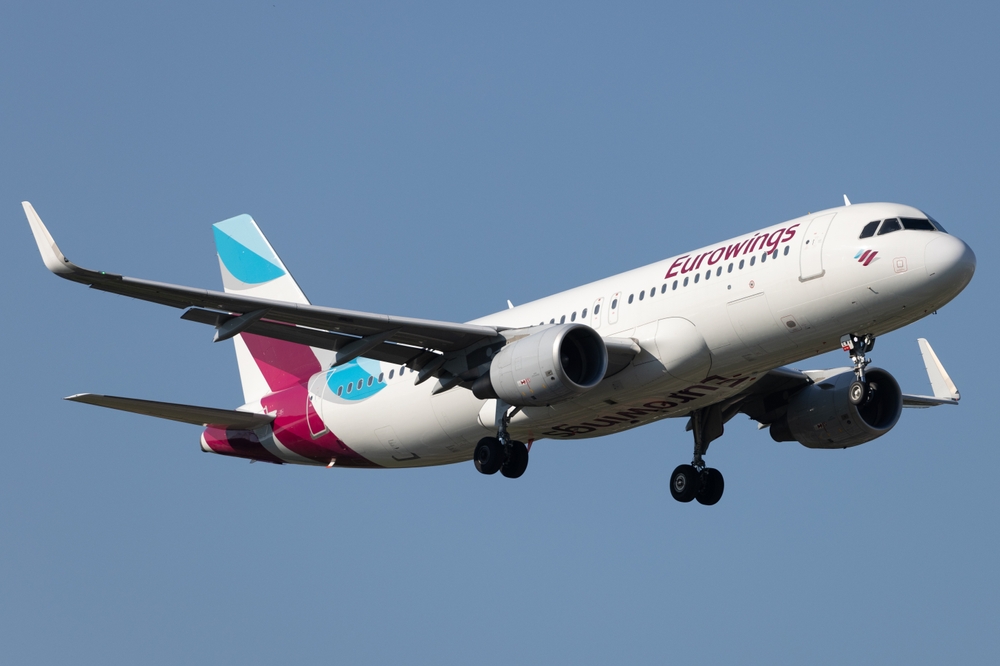
AirHelp, the travel tech company supporting passengers with flight disruptions, has analysed 2023 flight data by haul to share the best airlines to fly with from UK airports to avoid disruptions. The flight data is split between short-haul (less than 1,500km), mid-haul (between 1,500km and 3,000km), and long-haul (over 3,000km).
In 2023, more than 71 million passengers flew on short-haul flights from UK airports, halving to 35 million for mid-haul flights, and 28 million for long-haul flights. The data indicates that overall disruption rates across the three hauls were similar, with passengers on short-haul flights the least disrupted (30%) and those on mid-haul flights the most disrupted (34%). More than 4% of short-haul flights were cancelled, compared to 2% of both mid- and long-haul.
Short-haul airline comparison
AirHelp analysed flight data from airlines that carried more than 500,000 passengers on short-haul flights from the UK last year. Eurowings was the leading airport with 90% of 724,000 passengers departing on time. It had the lowest rate of passenger delays across the three categories: more than 15 minutes (8%), over two hours (0.3%), and over three hours (0.04%). The airline with the lowest cancellation rate was Jet2 with 0.07% of 991,000 passengers facing cancellations. Jet2 was tied with Iberia as the second-best airline for timely departures, with 78% of passengers departing on schedule.
Of the three most popular airlines for short-haul flights – EasyJet, British Airways, and RyanAir – RyanAir fared best overall, with 72% of passengers departing on time, and less than 1% of its 13 million passengers facing cancellations or delays of more than three hours. EasyJet and British Airways were both in the bottom three for overall timely departures, both with 62% of their 20 million and 15 million respective passengers departing on time, just above Swiss International at 59%. EasyJet also had the highest cancellation rate, with almost 7% of passengers facing cancellations, while 4% of British Airways passengers had their flights cancelled.
CEO of AirHelp, Tomasz Pawliszyn, comments: “We understand that as the volume of passengers increases, timely departures become more difficult to achieve. However, Ryanair demonstrated that it is possible to avoid frequent cancellations and delays on short-haul flights across the 13 million passengers it served last year.”
Mid-haul airline comparison
Looking at airlines with more than one million passengers flying on mid-haul flights from UK airports last year revealed Jet2 as the top performer, with 72% of its 7 million passengers departing on time, fewer than 2% of passengers delayed more than two hours, and 0.2% of passengers facing cancellations. Also making the top four for highest overall rates of timely departures were Ryanair (71% of 7 million), Wizz Air UK (69% of 1.6 million), and Wizz Air (67% of 1.7 million). However, both Wizz Air UK and Wizz Air had the highest rates of passenger delays of over two hours, at 6% and 5% respectively.
Tui Airways had the lowest rate of on-time departures, with 49% of 1.2 million passengers departing on schedule. Of the passengers disrupted, 5% were delayed more than 2 hours and almost 8% of passengers had their flight cancelled – the highest cancellation rate of mid-haul flights last year. Turkish Airlines also fared poorly for on-time departures with less than 51% of passengers flying on time, though only 2% of these were delayed by more than two hours.
With almost 3 million passengers on mid-haul flights, the UK’s flag carrier British Airways had 61% of passengers depart on time and saw almost 2% of passengers with their flights cancelled, the third highest cancellation rate. Easyjet, the largest UK carrier for mid-haul flights last year, saw 0.6% of more than 8 million passengers face delays of more than three hours, however, almost 5% of passengers faced cancellations.
Long-haul airline comparison
AirHelp also analysed the performance of airlines that carried more than 400,000 passengers on long-haul flights in 2023. All three of the best-performing airlines for timely passenger departures were American. American Airlines took the top spot with 84% of on-time departures and was among the most popular carriers with over 2 million passengers in 2023. Delta Air Lines (81%) and United Airlines (78%) followed as the most punctual.
Tui Airways fared worst with only 47% of 400,000 passengers departing on time and more than 7% of passengers facing cancellations – the second-highest cancellation rate last year. Cathay Pacific Airways, Hong Kong’s leading carrier, came in second with 50% of flights departing on time, but only 0.2% of its passengers faced cancellations. British Airways followed with less than 52% of passengers departing on time and more than 3% of 7.7 million passengers delayed by more than two hours. The airline with the most cancellations by a significant margin was Easyjet with 13.5% of its 440,000 passengers having their long-haul flights cancelled.
Singapore Airlines, Virgin Atlantic Airways, Etihad Airways, Emirates, and Air India all fared well for on-time departures with more than 70% of passengers departing on time. The majority of these delays and disruptions were not significant, however, Air India saw 3.5% of passengers face delays of more than two hours. Singapore Airlines, Etihad Airways and Emirates all had the lowest rates of cancellations (less than 0.15%) and delays of more than three hours (less than 0.5%).
“A common misconception among passengers is that flying with low-cost carriers (LCCs) or ‘budget’ airlines means you are more likely to face disruptions. This data shows that passengers flying on full-service airlines are not exempt from delays and cancellations, and LLCs can provide efficient and timely services. Passengers pay more for the pre-departure and in-flight experience, and so may expect better from these airlines when disruptions occur. However, many LCCs are excellent with customer care and handling claims for passengers. To ensure they are best protected, we urge passengers to learn their air passenger rights and be prepared for delays and cancellations as appetite for air travel continues to increase,” concludes Tomasz Pawliszyn, CEO of AirHelp.

